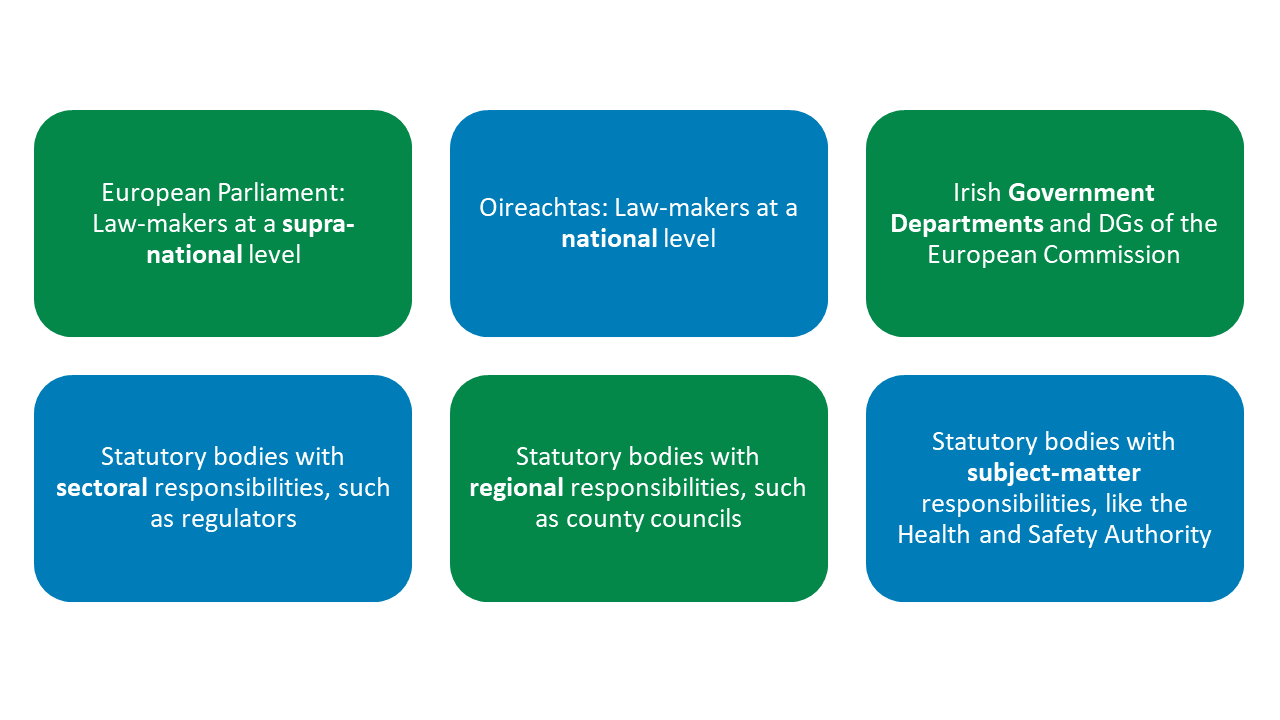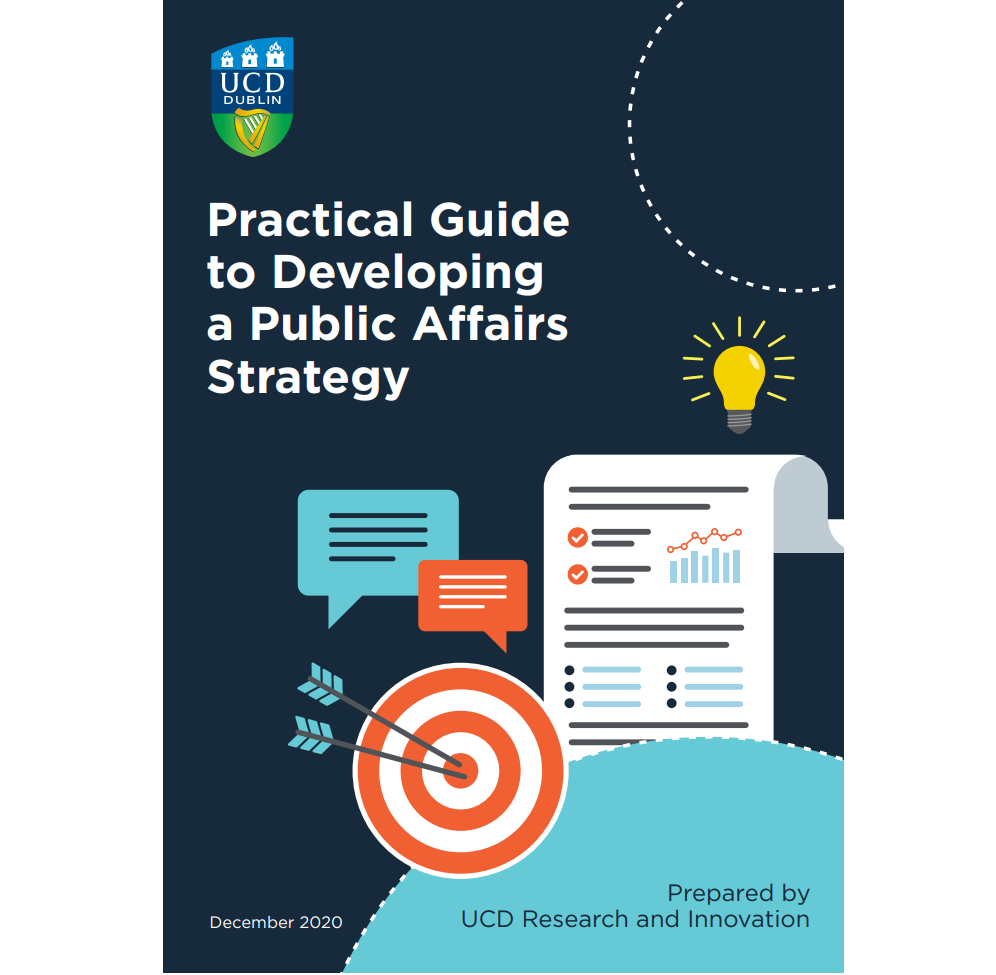Why bother?
Policymakers might find your research useful, and it’s possible that your findings can inform how policies are made and implemented. You may seek to inform policy for a range of reasons, including but not limited to:
- Helping address an issue in society that you care about (see our Impact Toolkit for more information on how your research can make a difference in the world).
- Building links with policymakers, researchers, and other stakeholders.
- Advocating for the value of scholarly research, strengthening the case for public funding.
- Building your reputation (as well as that of UCD and your colleagues).
- Helping shape the research agenda and set priorities (in Ireland and further afield).
How do I inform policy?
Policies are formed in many different ways, and at many different levels. Some examples are presented in the image below, adapted from the (opens in a new window)Cambridge University Policy Impact Guide:

But the policy community extends far beyond those who directly make and implement policies — a sprawling network of people feed into the policymaking process, from politicians and civil servants to lobbyists and consultants. And there are just as many ways to influence and inform policies. For example, you could:
- Submit written evidence to a relevant Oireachtas committee.
- Speak at an Oireachtas committee meeting (although you’ll have to be invited to do so). Consider reaching out to the Committee Chair and position your research as part of the Committee’s ongoing work, and ask if you can be included as part of a hearing. If you’ve been invited to speak, and would like specific advice, feel free to contact public affairs colleagues at UCD Research or the Geary Institute for Public Policy.
- Contribute to reports from interest groups.
- Reach out directly to a civil servant or policy analyst working in your area.
- Correspond with TDs about your research and its policy implications.
- Engage in ongoing public debates, through social media or the mainstream media for instance.
- Contribute to a political party’s manifesto.
- Apply for membership of the board of a relevant government agency or policy advisory organisation, such as the National Economic and Social Council or the Climate Change Advisory Council.
- Feed into Government consultations. Note that consultation responses from individual researchers often have less sway than joint responses from a group of experts, potentially through an interest group, representative body or learned society. So if you want to respond to a consultation, try to coordinate with other experts.
The route you take will be unique, reflecting your expertise, the issue you’re trying to address, and the various groups and organisations involved in the policymaking process. Think creatively about the most effective way to engage with the policy community to give your research the best chance of making a difference. Identify the most relevant players, learn about their agendas and motives, and consider the timing of your input relative to where they are in the policymaking process.
Our Impact Case Studies – like those from previous competition winners Michelle Norris and Crystal Fulton – showcase some of the routes that UCD’s researchers have taken to influence policy.
In Ireland, there are ongoing discussions in Government about mechanisms to ensure policies are based on robust evidence. It is a rapidly changing area, so keep an eye out for up-to-date information. The Royal Irish Academy has a discussion paper on the subject (opens in a new window)here.
How do I write for policymakers?
For the most part, policymakers rarely have the time or expertise to read traditional research outputs like journal articles or conference papers, relying instead on policy briefings, research syntheses, think tank reports, and so on.
If you’re in a position to create or contribute to a policy document, remember not to dumb down your findings or alter them to serve some political interest. A good rule of thumb is to assume you’re dealing with a non-technical audience, so present your research clearly and concisely, in simple language. Our page on developing your message offers some advice on writing a plain-English summary of your research. But try not to provide a generic summary – make sure that what you write is tailored to your audience, whether they’re civil servants, practitioners, or government ministers. Help them see why your research is relevant to their agenda.
Asking yourself some of these questions may help your writing have a greater impact:
- Do my intended audiences have any competing priorities?
- What exactly do I want them to do? Can I make clear, specific, and workable recommendations to policymakers?
- Is there political will to take up my recommendations or do I need to adapt them?
- Can I work with other bodies to strengthen my argument?
Policy writing is complex, reflecting the fact that a host of competing voices – some seen and some unseen – ultimately inform policy decisions. The best way to learn how to write an effective briefing is to read some successful examples ((opens in a new window)like these from the SPHeRE Network) in the relevant policy area.
But remember, don’t stop engaging after you’ve submitted your policy paper or consultation response. It’s not always sufficient to distil your research into a written product. Your evidence alone may not be enough to make a difference: you should try to build meaningful relationships with those you would like to inform. It is important that people have trust in your evidence, and in you as a researcher. For more information, read this chapter, by Professor Mark Reed of Fast Track Impact, on (opens in a new window)how to take a “relational approach” to engaging with policymakers.

Where can I learn more?
Attend an event
Experts in UCD’s Geary Institute for Public Policy sometimes run workshops and events to help researchers maximise the policy impact of their research. Keep an eye on upcoming events, and consider attending one in future.
Browse our database of policy papers, expert perspectives, and policy digests
You may also wish to familiarise yourself with (opens in a new window)publicpolicy.ie, an online platform funded by UCD to inform and debate public policy in Ireland. It provides independent evidence to influence economic, social and environmental policies, and to communicate relevant research findings to policymakers and interested citizens. Researchers can submit short (1,000-2,000 word) summaries, explaining the policy implications of their research. Read some of these summaries for inspiration, or consider submitting your own.
Read other guidance documents
In December 2020, colleagues in UCD Research published a practical guide to developing a public affairs strategy. Similarly, here is a useful (opens in a new window)‘how to’ guide for policy impact, from the University of Cambridge, and another from the (opens in a new window)Scottish Policy & Research Exchange.
How can I monitor public policy?
You might find some of these sources useful for monitoring public policy in Ireland:
- (opens in a new window)Merrion Street provides news and updates from government.
- (opens in a new window)Kildare Street is an archive of what’s been said in the Dáil, the Seanad, and Committee meetings
- (opens in a new window)Houses of the Oireachtas – you can sign up for alerts on This Week in the Houses of the Oireachtas, The Dáil Schedule, and the Committee Schedule.